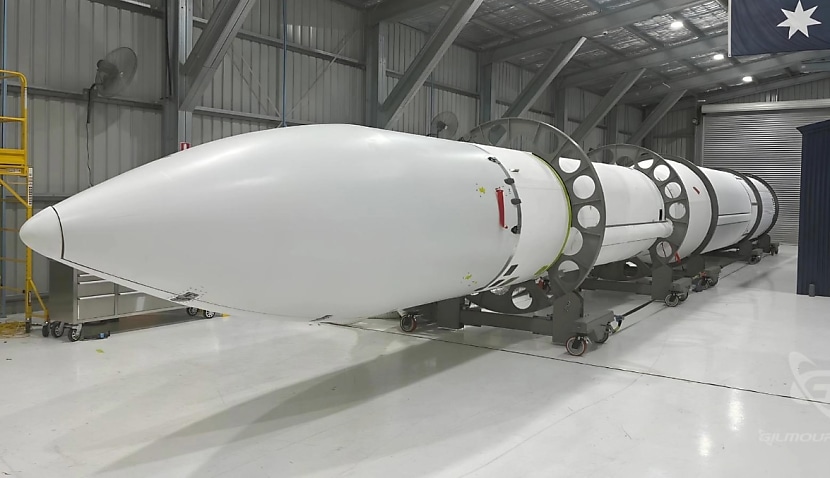
The Gold Coast-based company said the additional capital would help fund four blast-offs of its three-stage launch vehicle, which has been in development for eight years.
Organisations to tip in included Australian superannuation fund Hostplus, venture capital fund Blackbird and the Queensland Investment Corporation (QIC), owned by the state government.
Gilmour aims to fill a gap in the global market by blasting off small satellites using both its own launch vehicle and spaceport in Bowen, north Queensland. The business already employs more than 100 people and hopes to increase its total headcount to more than 300 by mid-2027.
“When we first invested in Gilmour, the team had just produced a 10-centimetre diameter hybrid rocket engine,” Blackbird co-founding partner Rick Baker said.
“It was a cute little thing that produced a fierce little flame, but the ambition of Adam and the team to build a full-scale rocket was clear.
“The achievements of the team in taking that technology through years of testing and iteration are coming to a head now.
“This funding round will allow Gilmour to attempt multiple launches and to become the first Australian-built rocket to get to orbit. We’re so excited to be on the journey with the Gilmour team.”
Gilmour’s Eris launch vehicle is unique because its propulsion system – developed entirely by the business in Australia – uses a combination of solid and liquid propellants to produce a record 115 kilonewtons of efficient combustion.
It was assembled for the first time earlier this month and will soon try to secure its launch licence from the Australian Space Agency prior to blast-off.
“As long as we get off the pad and start heading towards space then we will get valuable data that we can use for second, third and fourth launches to make them more reliable,” founder Adam Gilmour told the AFR.
“We’ll have validated a heck of a lot of technology with a 10 or 20-second burn.”
The investment comes after Space Connect reported last year how Prime Minister Anthony Albanese hailed Gilmour as a “great Australian success story” during a visit to its factory on the Gold Coast.
“When this rocket goes into space, it will carry 300 companies with it. Australia will become the 12th country in the world to be able to have access to this technology – designed, manufactured, and built right here (on the Gold Coast) and creating high-quality jobs,” PM Albanese said.
“This is one of the companies that we’re looking at when we have our National Reconstruction Fund and that whole agenda about a future here made in Australia – making use of an Australian procurement policy to buy Australian and making sure we back Australian science and innovation.
“Australia can compete with the rest of the world. What we need to do is to back our businesses that are doing it. This is truly an Australian manufacturing success story, and we want more of them.”
Other new investors in the business, now valued at $605 million, include superannuation fund HESTA and venture capital firm Main Sequence.
Patrick Christiansen, QIC’s private equity investment director, hailed Gilmour’s ability to compete as a full-service launch provider.
“Growing sovereign capabilities in Australian aerospace is often talked about, but it’s Adam and his team knuckling down and making it happen,” Christiansen said.
“Never has an Australian-made, Australian-owned rocket launched into orbit, and we join the nation in eager anticipation as all eyes turn to Bowen for history to be written.”

Adam Thorn
Adam is a journalist who has worked for more than 40 prestigious media brands in the UK and Australia. Since 2005, his varied career has included stints as a reporter, copy editor, feature writer and editor for publications as diverse as Fleet Street newspaper The Sunday Times, fashion bible Jones, media and marketing website Mumbrella as well as lifestyle magazines such as GQ, Woman’s Weekly, Men’s Health and Loaded. He joined Momentum Media in early 2020 and currently writes for Australian Aviation and World of Aviation.
Receive the latest developments and updates on Australia’s space industry direct to your inbox. Subscribe today to Space Connect here.









